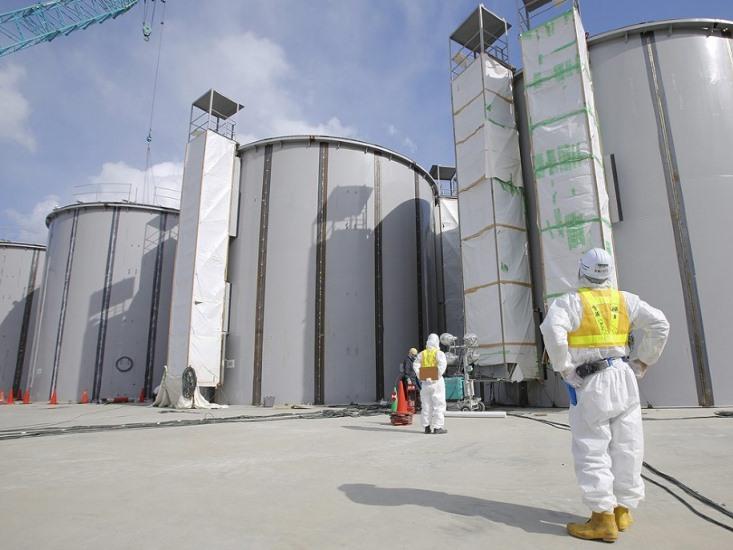Environment & Energy
Related: About this forumNo One Knows What to Do With Fukushima’s Endless Tanks of Radioactive Water
This is what passes for good news from Fukushima Daiichi, the Japanese nuclear power plant devastated by meltdowns and explosions after a cataclysmic earthquake and tsunami in 2011: By the end of last month, workers had succeeded in filtering most of the 620,000 tons of toxic water stored at the site, removing almost all of the radioactive materials.
After numerous false starts and technical glitches, most of the stored water has been run through filtration systems to remove dangerous strontium-90, as well as many other radionuclides. TEPCO, the Japanese utility that operates the power plant, trumpeted the achievement: “This is a significant milestone for improving the environment for our surrounding communities and for our workers,” said Naohiro Masuda, TEPCO’s chief decommissioning officer, in a press release.
But it’s not quite so easy to bounce back from a nuclear disaster of this scale. For one thing, don’t take TEPCO’s statement too literally: No one is living in the “surrounding communities”—they’re far too contaminated for human habitation. Furthermore, the filtered water is still full of tritium, a radioactive version of hydrogen. (When two neutrons are added to the element, it becomes unstable, prone to emitting electrons.) Tritium bonds with oxygen just like normal hydrogen does, to produce radioactive “tritiated water.” It’s impractical—or at least extremely difficult and expensive—to separate tritiated water from normal water.
Hence TEPCO’s dilemma—which gets bigger by the day.The enormous volume of water comes from the ongoing need to keep the three melted-down reactor cores cool. More than four years after the disaster, pumps still must pour a constant stream of water into the pressure vessels that contain the radioactive cores. But the meltdowns and explosions rendered those vessels leaky, so TEPCO collects the water that seeps out, as well as rainwater that flows down the hills and through the shattered buildings.
more
http://nautil.us/blog/no-one-knows-what-to-do-with-fukushimas-endless-tanks-of-radioactive-water

Erich Bloodaxe BSN
(14,733 posts)Should we give a crap? If it bankrupts them, they should be required to pony up every penny they can to do it. You want to make money off of it, you have to be willing to lose money when you screw up bigtime, such as by putting nuclear plants in unsafe places.
localroger
(3,619 posts)It would take a huge industrial facility days to separate just a few gallons. This is basically the process by which U235 is separated from natural uranium. It's easier with water because the mass difference is greater, but it's still very slow and energy intensive.
FBaggins
(26,714 posts)Despite the author's attempt to spin ongoing EPA evaluation as being uncertainty of risk levels... there's no plausible way for the tritium to be a heath concern to people or sea life.
It's far too weak to hurt you with external exposure (it can't even get through the first layer of dead skin cells) and (since it's basically water) it doesn't stay inside you long enough to do any damage even at far higher doses. Bioaccumulation doesn't occur... hot particles aren't possible... it's actually safer being diluted into the ocean.
Fumesucker
(45,851 posts)Make sure there are plenty of government warning labels on it to increase demand.
n2doc
(47,953 posts)madokie
(51,076 posts)If it wasn't for lies the nuclear industry could not exist. Thats all they have and all they've ever had. Many of us around here found that out when we were putting a stop to PSO building a nuclear power plant less than 20 miles upwind of where I am right now.
I remember when a few posters here were saying there are no melted down cores there and on and on. Time proved them wrong as it always seem to do
awoke_in_2003
(34,582 posts)PuraVidaDreamin
(4,099 posts)They will always need to keep these reactors cool.
Imagine this happening in California's drought stricken regions without
The ability to pull in ocean waters to keep the reactors cool!
phantom power
(25,966 posts)FBaggins
(26,714 posts)Sounds like someone does know what to do with it.
phantom power
(25,966 posts)hunter
(38,300 posts)PatrickforO
(14,556 posts)madokie
(51,076 posts)Move along nothing to see here --- shoo
needledriver
(836 posts)And use it for fracking.
After all, fracking is perfectly safe and there is no chance of cross contamination of groundwater.
Just like nuclear energy is safe and it will be too cheap to meter.